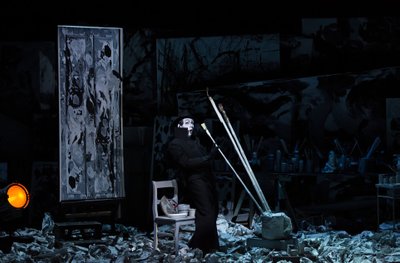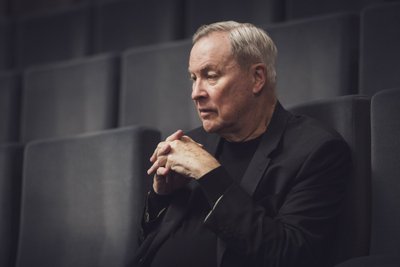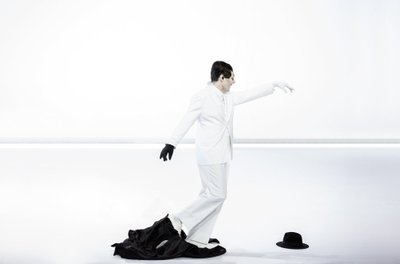Before the opening, Professor of theatre studies of the Faculty of Arts at Vytautas Magnus University Jurgita Staniškyte had an exclusive interview with the director about his work methods and what fosters his creativity.
- I would like to start our conversation with a question about your production of “Dorian” at Kaunas National Drama Theatre. “Dorian” has already had its premiere in Dusseldorf with great reviews. What is the difference between work in Dusseldorf and Kaunas in terms of the production process, working with actors and theatre culture in general?
- The production here in Lithuania is different from what we did in Dusseldorf. First of all, the big difference is that in Germany it was performed by one actor and in Kaunas, we have two. I had always thought that this work was about the number two - thinking that two is one. Like you have two hands, a left hand and a right hand, and their functions are very different from one another, but it's one body. Or you have a left side of the brain and a right side of the brain, but it's one mind.
Secondly, it is different because of language. The German language allows you to really bite and speak the words more sharply. Here it is a different color, a different rhythm and a different formation of words. So musically, it is quite different.

So yes, performance is different here, but it is based on the same idea. “Dorian” is based on what I did in Dusseldorf, where initially I did most of the production myself. On the first day of rehearsal, I did the first scene for 34 minutes in silence, without text, just to see if physically I could hold a public with the movement and to learn the map of the choreography of the stage. So it was a way I could get it in my body and then transfer it to the German actor Christian Friedel. Of course, he has a different body, so it is different, but it was based on something I did originally.
The actors here physically are very different from Christian Friedel, so even though they follow the outline of what I originally did, the story in some ways becomes different. No director can direct someone how to feel or really tell actors what to think - you have your own thoughts and feelings. In that way, performance becomes their work, the actors’ work and not mine.
- In many interviews, you have said that stillness and movement are the most important elements of your work. One might think that this so-called ‘Wilsonian movement’ can be quite difficult for actors trained in the psychological school of acting. Can you elaborate on whether it is a challenge or a stereotype?
- Some anthropologists believe the man was moving before speaking and from movement came sound. My early works were all silent. I wrote my first plays with a deaf-mute boy who had never been to school and knew no words. They were based on his observations of looking at the world silently. I learned a lot from that boy about listening and seeing. He heard nothing in the eardrum but his body was feeling vibrations of sound and, in a sense, his body was hearing.
So ever since in all the hundreds of productions, I have directed I usually stage the work silently first and then later put text. It is very curious, that we think about theatre as primarily being a text that is spoken and written and therefore using the visual side of it only as a decoration. We even call it stage decorations. I think theater should be architectural.

When I first went to see Broadway plays and went to the opera, what I was seeing was always an illustration of what I was hearing, but I thought that what we see is as important as what we hear. In this production of “Dorian” as well as in all of my work, what we see is one thing and what we hear is another. And they’re not arbitrarily placed opposite one another, but they're there to reinforce one another through their dualism, through their parallelism. In that way it is strange for almost any actor, especially Western actors, to do something that is one thing and say something that is another.
It's a little bit like if you watch television and turn the sound off, you begin to look at the news broadcaster in a very different way. Or if you're listening to a radio, you're free to imagine what the room or the speaker looks like. The space is wide open. And in some ways, my work is like taking a radio drama and putting it with a silent movie.
- In your interviews, you talk about complex yet classical structures embedded in your works filled with visuality and abstraction. And I think this is exactly the groundbreaking nature of your performances. Why do you think we can still encounter prejudice against abstraction in theatre? You once said that paradoxically we accept abstraction in painting and dance, but struggle with it in theatre. Is it a Western tradition or maybe something else?
- Yes, it is a western way of thinking. My work is closer to Eastern philosophy. In Zen, you can freely associate with whatever you're hearing or whatever you're seeing and you can think about it in multiple ways. So much of Western thinking is based on Greek philosophy - I do something because of a causal factor. Whereas I don't need a cause to do what I do. If you start with a cause, you will make an effect. You can start with the effect, and if you want, you can find a cause or a reason.
My theater is a theater of something we experience. And one of the problems I have with theater is that a lot of times it exists in someone's head: either the director's head or the actor's head. They're thinking, and that's so boring for me. In many ways, my work is more like animal behavior, where the mind is a muscle and this is how one knows what one knows. How does a cow feel when there is an earthquake? How does an elephant with his foot feel the earth? How does a dog walk to a bird? They are not listening just with their ears, but it is with their foot touching the ground, their back, their tail – with their whole body.
I think psychology is focused too much on what is happening in the head. However, I'm more interested in the experience of whatever I'm hearing and seeing. I find it much more interesting to ask ‘what is it’, rather than saying what something is. Often in the theater I feel that the director, the actor, the designers are trying to tell me something. It's like a bad high school. I think the reason for doing art is to say, ‘what is it’?
If you look at W. Shakespeare's text, let’s say ‘Hamlet’, which I have performed myself, W. Shakespeare couldn't completely understand what he wrote. Because it is not meant to be completely comprehended – it is something that you think about and you can continue to think about it forever. One night you can think about Hamlet one way, the next night you can think about it another way, and 10 years later you can still think about it in a different way. It is full of meanings; you can reflect on it in multiple ways and in that way it is more like Zen philosophy.
Whether you call this abstraction or not, I don't know. “Einstein on the Beach” with Philip Glass or my latest work “H” 100 Seconds to Midnight” in Hamburg at the Thalia Theater both have very classical themes and variation constructions. People said, well, it is abstract, but it is not. They said it is so radical and new. It is not, it is theme and variation - man has been doing that forever.

- You have created one of the most recognizable styles in contemporary theater, and you have already made almost 200 productions. How do you foster your creativity? What is the secret of your creative strength?
- Well, it is a way of living. It is not like I wake up in the morning and get dressed, go to an office, do work, and then go home and watch television. My life is my work. It is like breathing. If I had gone to a theater school, which I did not, and had studied theater, I would never be making the kind of theater I'm making.
I was 27 years old. I was walking down the street in Summit New Jersey, and I saw a policeman about to hit a black boy over the head with a club. I grabbed the arm of the policeman and said, ‘Why do you hit the boy?’ And the policeman said, ‘It's none of your business.’ And I said, ‘But it is. I'm a responsible citizen.’ After some time, the tension eased and I walked down the street with a boy and the policeman and heard the sounds coming from him, and recognized them as that of a deaf person. To make the long story short, eventually, he had no legal guardian and I adopted him and I wrote my first plays with him. This happened by accident, by walking down the street and accidentally seeing this situation that completely changed my life.
Several after years after that, I was introduced to an autistic boy Christopher Knowles, who organized his thoughts mathematically and was in an institution for brain-damaged children, where his writings were being corrected. I however found it interesting and thought that we should encourage him to do more. Eventually, with the agreement of his parents, he left the institution and came to stay with me and I wrote my first plays with spoken text with him. He wrote the text for “Einstein on the Beach”, Philip Glass opera. They were composed mathematically, with theme and variation. But again, I met this boy by accident and it also changed my life and my way of thinking. So I learn by living. It is not necessarily reading something in a book or going to school and being told something. It is something that happened to me walking down a street, meeting someone by chance and transforming the direction of my life.
- I would like to hear your opinion about acting in contemporary theatre. You yourself have performed in several of your works. How can an actor express his or her creative freedom or creative agency in the strict structure of the stage-director’s vision?
- Freedom comes from being mechanical. You can see a hundred productions of “Swan Lake” or “Giselle”, where ballet dancer is still doing the same movements that were choreographed in the 19th century. Why is it that one woman as a dancer, is more beautiful than the other? They're doing the same steps and the music is the same. The answer is how they feel in the form, and no director can tell you how to feel.
In the 50-something years that I've been working in the theater, I've never, ever told an actor what to think. They're given very formal directions, but what they think is up to them or what they feel in the form is up to them. The form is ultimately not what's important it is how you feel in the form.
I usually rehearse a scene over and over again many, many times. By repeating it and repeating it until it becomes mechanical. That's how you get freedom by trying to be as mechanical as possible. Charlie Chaplin, in his films, had sometimes 275 different takes of one scene to get that freedom.
I once asked a principal ballet dancer from New York City Ballet about George Balanchine’s “Symphony in C”, and how does she do it. And she said, ‘I have no idea, but when I do it, I know.’ She has programmed the muscle and the muscle is a mind. In doing it, she knows what to do, but it is not in her head, it is in her muscle.

You have to train the muscle and you do it by repetition. And every second will always be different. The only thing that's constant is change. So even though you're doing the same thing every night mechanically, it's always different, because every second is always different. Perhaps by becoming mechanical, you are more aware of this constant change.
- I tell my students that Robert Wilson has transformed the understanding of contemporary theatre as an audiovisual landscape. Thanks to your work we think about theatre differently, not in terms of literary text but rather in terms of visual narration. I wonder, how often are you still being asked to explain your performances or to answer, why images are not illustrating text?
- If we look at the history of theater, for example, ancient Greek theater, we see that actors wore masks. The audience heard a text from behind the mask. Similarly, in the classical kathakali theater tradition of India or the classical theater of China, the Peking opera, there is a mask and we hear a sound behind it. The work that I do is the stage picture which is a kind of mask for a text. In that way, it is very classical and very traditional.
I think naturalism - when you see someone on stage trying to act natural – for me it always seems so artificial. Being on stage is always something artificial. You don't sing on stage the way you sing in the shower, you don't stand on stage the way you stand on the street waiting for a bus. The stage is unlike any other space.
I learned a lot from Marlene Dietrich. I met her in 1971 in Paris, where I saw her many times performing her solo act. I saw her 17 times and I observed everything: her movements were almost always exactly the same every night. I invited her to dinner and she said, with pleasure. So I had dinner with Marlene Dietrich and a man came to the table and said, Oh, Miss Dietrich, you're so cold when you perform. And she replied, ‘You didn't listen to my voice.’ It was true, she could be icy cold with her movements, but the voice could be very hot and sexy, and that was her power. Basically, when I hear one thing and see another, they reinforce one another without having to illustrate one another.
In Japan, I did a production with a great Noh actor Hideo Kanze and he took me to see 14th century Noh play. I was very curious about the movements in this performance and Hideo Kanze explained that they are not there to follow the text, they are pure and stand on their own. They are not illustrating the text, but they are movements for movement’s sake. And this is a performance from the 14th century being performed today. So it is only in recent times did we get to this psychological, natural theater, which I find boring and a lie. This way my work is much closer to classical traditions of theater.
My work is visual. It is constructed the way a composer would write music with themes and variations. Or the way a choreographer makes a dance. Those are times space constructions that are not dependent on illustrating a story or a text. I think one reason that my work has been accepted in many different countries is that it is visual - you don't need a translation of language because it's something you see. I'm a visual artist and it has allowed me to work all over the world.
“Dorian” has been created together with the D’haus Theatre (Düsseldorfer Schauspielhaus) in Germany, Düsseldorf.
